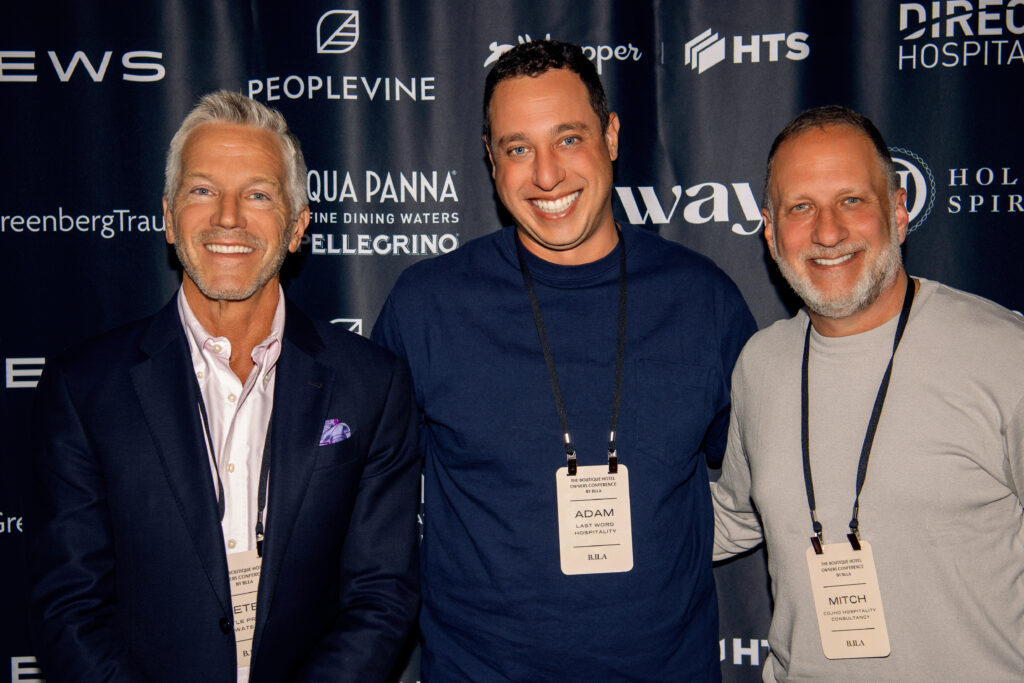Sincerely, BLLA
Creating Memorable and Efficient F&B Operations in Boutique Hospitality
Exploring the strategies behind successful restaurant concepts in an ever-changing market. In the ever-evolving boutique hotel landscape, food and ...
Sincerely, BLLA
Exploring the strategies behind successful restaurant concepts in an ever-changing market. In the ever-evolving boutique hotel landscape, food and ...
In the ever-evolving boutique hotel landscape, food and beverage (F&B) operations have become a key differentiator, offering guests unique experiences while navigating the complexities of operational efficiency. At the recent Boutique Hotel Owners Conference, industry leaders shared insights into what makes an F&B concept work—and how to overcome the inherent challenges.
Moderated by Peter Wright, Division Manager of Nestle Premium Waters, the panel featured Adam Weisblatt, Founder of Last Word Hospitality, and Mitch Prensky, Founding Partner and Chief Culinary Officer at COJHO Hospitality Consultancy, two experts who discussed the intricacies of running successful F&B outlets within boutique hotels.

One of the key strategies highlighted was conducting a gap analysis. Weisblatt emphasized that developing a successful F&B concept starts with understanding what is missing from the market. This involves looking beyond personal preferences or trendy ideas and conducting a thorough feasibility study and gap analysis. “You have to ask yourself what’s in the market already and what’s not,” he explained. Identifying gaps in the market and filling them with concepts that are not only unique but also culturally relevant is essential. He shared a practical example from Austin, Texas, where they discovered a market oversaturated with barbecue and Tex-Mex but lacking Italian cuisine—a surprising finding that led to the creation of a successful venue.
In an industry where operating costs continue to rise, from labor to food sourcing, the focus on efficiency was a recurring theme. Prensky discussed the delicate balance between creativity and practical execution. “Execution is everything,” he said. The challenge for boutique hotels lies in executing a memorable dining experience while maintaining cost efficiency.
Prensky shared that, especially in hotels, F&B outlets are “a business within a business,” and hoteliers need to treat them as separate, self-sustaining entities. “F&B may look similar to hospitality, but it’s like a horse and a zebra—they don’t have a lot to do with each other,” he quipped, pointing out the necessity of having dedicated systems in place for running restaurant operations effectively.

Weisblatt highlighted how evolving guest preferences are changing the F&B game, with fewer guests drinking alcohol and more gravitating toward unique, non-alcoholic offerings. “We’re seeing a drop in alcohol consumption, which means investing in non-alcoholic beverages to drive sales becomes crucial,” he explained.
Wright reinforced the importance of understanding guest behaviors: “Great experiences are more critical than ever, especially with spending patterns shifting. If you’re not focusing on creating memorable moments, you’re leaving value on the table.”
Regular, local customers are also key to long-term success in hotel restaurants, which means concepts must be versatile enough to appeal both to locals and international travelers who may have different expectations.
The conversation naturally turned to creativity and staff engagement as vital components of maintaining a competitive edge. Prensky shared how regular, themed events like his “Sunday Supper” concept allowed his staff to engage more deeply with the menu while offering guests something new. These recurring events kept the restaurant top of mind for regular guests and the press while giving staff a sense of ownership in the menu, enhancing their creativity and commitment.

Finally, the panel touched on the financial realities of F&B operations. Wright asked about strategies to ensure profitability amidst rising costs and changing guest behaviors. Both Weisblatt and Prensky emphasized the need for efficient layouts and smart menu design to reduce unnecessary overhead. For example, Prensky advocated for smaller, more focused menus that allow for flexibility with specials, which help control food costs while still offering variety.
“Restaurants thrive on efficiency,” said Weisblatt, emphasizing that optimizing every part of the operation—from how the kitchen is laid out to how guests are seated—can make the difference between success and failure in today’s challenging market.
By focusing on guest preferences, efficient operations, and market gaps, boutique hoteliers can turn their F&B outlets into thriving, integral parts of their guest experience. As the panelists agreed, creativity, engagement, and adaptability are crucial to keeping F&B operations both exciting and profitable in the boutique hotel industry.
Birmingham, Alabama (July 2025) — New Birmingham, Alabama boutique hotel, The Painted Lady(2143 2nd Ave S), is the latest to join Lark’s portfolio...
This week’s issue explores how boutique hotels are embracing deeper cultural immersion, expanding into new global markets, and leaning into exclusivi...
